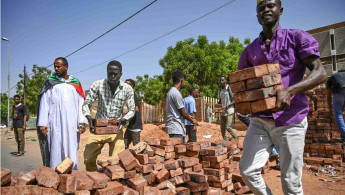Sudanese activists vow to 'peacefully escalate' protests
Sudan's governing transitional military council warned on Tuesday of "chaos" and that "infiltrators" had taken over Sudan's protest movement, as leading activists vowed on Monday to fight peacefully against attempts to disperse an ongoing mass sit-in.
A spokesperson for the transitional military council on Monday claimed negotiators representing protesters had agreed to remove roadblocks located at various points around a sit-in outside the Army General Command in Sudan's capital Khartoum.
The sit-in began on 6 April with a "million-man march" of Sudanese demonstrators demanding the fall of former President Omar al-Bashir and the formation of a transitional government.
The military later overthrew Bashir in mid-April, taking power in a coup and forming a transitional council.
Thousands of Sudanese have continued to protest, not only in Khartoum but across the country, for an end to martial rule and the formation of a civilian-led transitional government.
While on-and-off negotiations between the Alliance for Freedom and Change (AFC) - an umbrella organisation dominated by the main protest organisers of the past few months, the Sudanese Professionals Association - and the military have led to an agreement on the formation of a joint civilian-military transitional council, many Sudanese, including the AFC, do not trust the military.
In an "urgent announcement" made on Monday night, the SPA rejected claims negotiators had agreed to the removal of roadblocks and called on the "revolutionaries at the sit-in" to fortify and build more roadblocks and barricades.
It also called on people from other areas of the capital and its surrounds to join the sit-in.
"The revolution will not back down from its objectives, will not betray its martyrs, and the revolutionary Sudanese people are fully prepared for peaceful escalation at any moment," announced the SPA.
 |
| Protesters reinforced makeshift roadblocks overnight after a military warning [AFP] |
Photos and videos distributed on social media showed protesters reinforcing barricades at the sit-in on Monday night and Tuesday.
The military has since made statements condemning what it called "negative security phenomena" exhibited by protesters, who it accused of looting, assault and harassment.
The transitional military council on Tuesday said that while it had a "moral duty" to fulfil Sudanese citizens' desire for a "civil democratic state", it would not accept "chaos".
"We are committed to negotiations but we will not accept chaos after today," the council's deputy leader Mohammad Hamdan Daglo, widely known as Himedti, said.
While the deputy leader said that the military would not use force to remove barricades set up by protesters, claims of "infiltrators" and "chaos" may set the stage for future confrontations.
Himedti claimed that there were "infiltrators" within the popular protest movement who were attempting to stoke "chaos".
Some of these "infiltrators", he claimed, had called on protesters to storm Khartoum's presidential palace.
"Our duty as a military council is to protect civilians, and - to facilitate demands on the council to ease the movement of citizens, roads, train tracks and bridges must be opened," he said, calling for a "civilised revolution" and a "youth without an agenda".
"The closure of train tracks and bridges, the inspection of the armed forces and looting are the biggest disaster," Himedti claimed.
The dispute over the sit-in barricades is not the only disagreement between the AFC and the military.
Tension over the composition and leadership of a planned joint civilian-military transitional council is still ongoing.




 Follow the Middle East's top stories in English at The New Arab on Google News
Follow the Middle East's top stories in English at The New Arab on Google News


